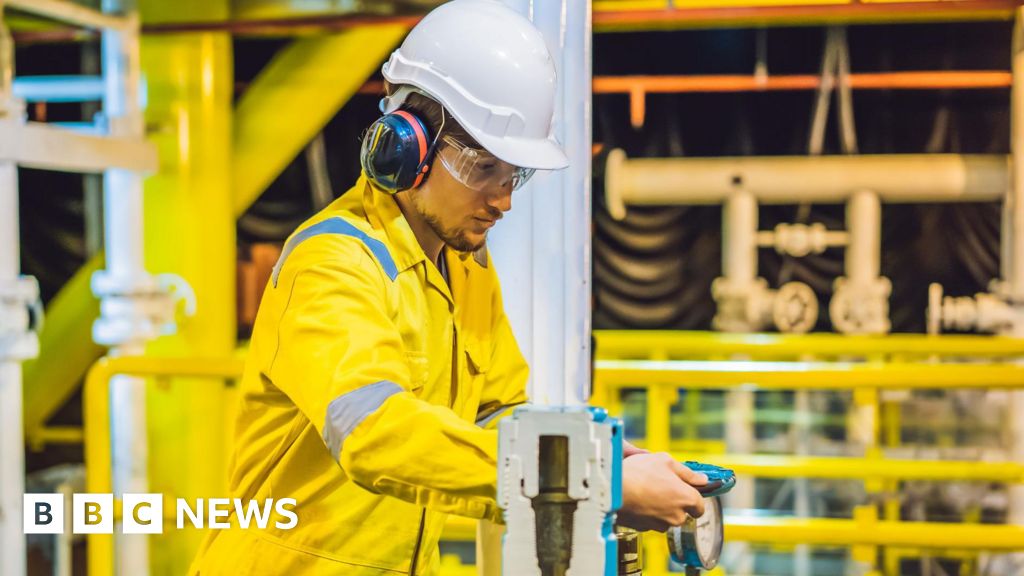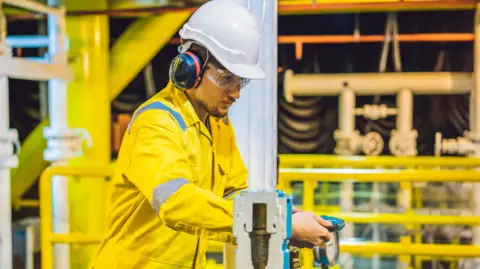Fears over energy tax rises as business confidence falls

 Getty Images
Getty ImagesRaising the windfall tax on the UK’s oil and gas companies will hit the government’s main goal of growing the economy, the industry has said.
Offshore Energies UK (OEUK) said the planned hike would cause investment in the sector to plunge and result in a loss of £13bn to the UK economy from 2025 to 2029, putting 35,000 jobs at risk.
The warning came as a leading business group warned that talk of tax rises and employment rights has “dented confidence in the environment for business in the UK”.
A Treasury spokesperson said the government was committed to a “constructive dialogue” with the oil and gas industry over changes to the windfall tax.
Under government plans, the Energy Profits Levy (EPL) – which is the official name of the windfall tax – is due to rise from 35% to 38% on 1 November on the profits oil and gas firms make in the UK.
Companies operating in the North Sea are already taxed differently to others. They pay 30% corporation tax on profits as well as a supplementary 10% rate.
It means from November, the total tax rate on profits made by energy firms in the UK is expected to rise to 78%.
The government has also announced it wants to extend the length of the levy until 2030, and that it will “tighten” investment allowances, which have allowed firms to reduce the amount of tax paid if they invest in projects, such as green energy, in the North Sea.
OEUK said the policy changes would “undermine” the industry’s ability to “support the government’s overarching goal of driving economic growth”.
Its analysis follows previous concerns from firms over the Labour government’s plan to increase the windfall tax on profits made by energy companies.
The industry body’s analysis claimed:
- The expected tax take from oil and gas producers would “increase in the very short term” by £2bn but then would later result in a £12bn loss in receipts.
- A “rapid decline” in investment from £14bn under the current tax policy to £2bn by 2029.
- About 35,000 jobs would be at risk in 2029 alone due to projects not going ahead.
“This is a government that has made economic growth its main priority and yet our analysis shows that its policy will ultimately reduce this sector’s contribution to the UK economy,” said David Whitehouse, OEUK chief executive.
The EPL was first introduced in May 2022 by the previous government in response to surging oil and gas prices.
With household energy bills soaring, the windfall tax was designed to help fund a scheme to restrict gas and electricity bills, which has now ended.
OEUK argued the original EPL was intended to be a “temporary tax in response to the economic environment at the time”.
The “windfall conditions” that the EPL was designed to address had since passed, it added.
A spokesperson for the Treasury said: “We are committed to maintaining a constructive dialogue with the oil and gas sector to finalise changes to strengthen the windfall tax, ensuring a phased and responsible transition for the North Sea.
“Our plans for a new National Wealth Fund and Great British Energy will create thousands of new jobs in the industries of the future.”
‘Dented confidence’
In the run-up to the general election, Labour positioned itself as the party of “wealth creation”, with the aim of improving living standards for working people.
Central to that was its claim that it would encourage businesses to invest more, something that has been languishing since 2016. The party hoped this would lead to more funding for training, skills, technology and buildings which, economists say, would make the UK more productive.
However, last week, Prime Minister Sir Keir Starmer warned the autumn Budget in October, where the government will outline its taxation and spending plans, would be “painful”.
Talk of tax rises and increased employment rights has “dented confidence in the environment for business in the UK”, said Anna Leach, chief economist at the Institute of Directors (IoD) business group.
The IoD’s Directors’ Economic Confidence Index, which measures business leader optimism, hit a three-year high in July, but fell back sharply in August, according to the latest survey.
“It’s disappointing to see [July’s] welcome uptick in business leader confidence snuffed out over the summer,” said Ms Leach.
The group said investment intentions for the year ahead saw the sharpest decline since the beginning of the Covid pandemic lockdowns.
Revenue and headcount expectations for business bosses also fell last month.
“We are calling on the government to take time to get policy design right for the long-term, and deliver the stable tax and policy framework needed to drive business confidence and investment,” Ms Leach added.
‘Mixed picture’
Also on Monday, the CBI Growth Indicator survey said private sector firms expected activity to rise “modestly” in the three months to November.
CBI interim deputy chief economist, Alpesh Paleja, said this was “encouraging”, but added that its survey painted a “very mixed picture”.
He said consumer-racing businesses were still “struggling” and momentum in manufacturing remained “tepid at best”.
Ahead of the Budget on 30 October, he said firms would want to see policies which can help turn this mixed outlook into a “far more positive outcome for all sectors for the rest of the year”.
He added: “Whether that’s reducing costs – for instance through long overdue business rates reform – or setting out a business tax roadmap to attract investment.
“All this can help to deliver the return to long-term sustainable growth that new government has promised, and firms across all sectors want to see.”
Related
Why investing in women is a vital next step for…
Get Nadine White's Race Report newsletter for a fresh perspective on the week's newsGet our free newsletter from The Independent's Race CorrespondentGet our fre
Business secretary signals major shift on electric car policy to…
In a determined effort to retain Nissan’s manufacturing presence in Britain, Business Secretary Jonathan Reynolds has vowed to implement “substantial c
Joint Statement: Business Secretary and Fujitsu Services Ltd
Business and Trade Secretary Jonathan Reynolds today (Friday 7 March) met chiefs for Fujitsu in Tokyo to begin talks over the cost of redress for victims of th
UK foreign secretary backs multilateral defence funding for Europe
UK foreign secretary David Lammy has said that a new multilateral fund will be needed to secure Europe’s defence as he confirmed that Britain is “open to”













